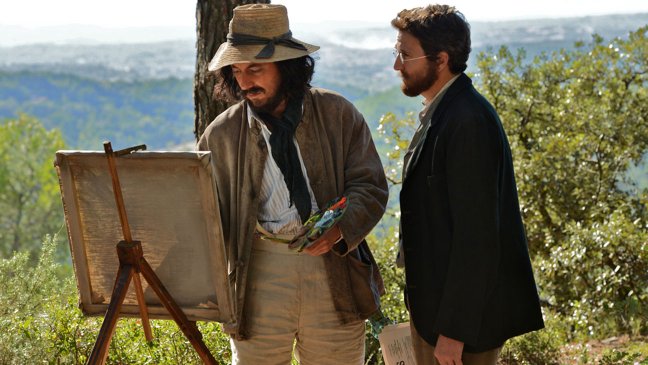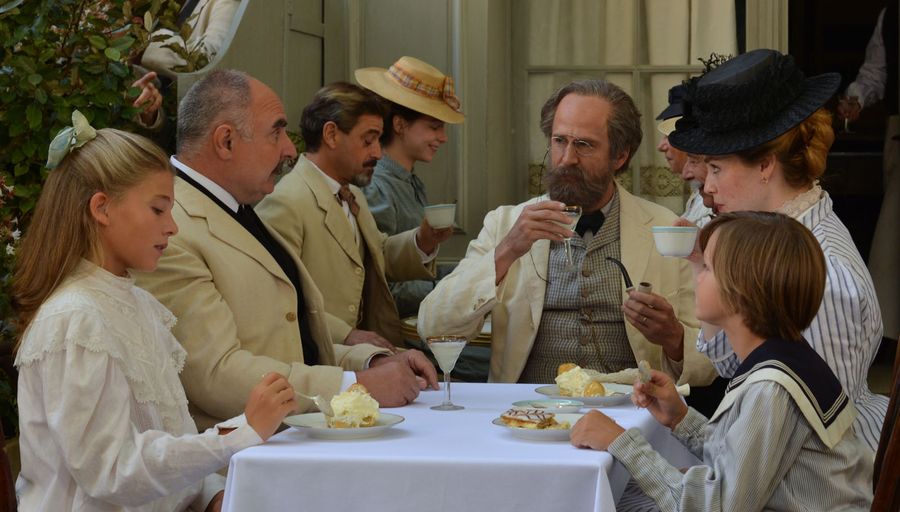Interview: Guillaume Gallienne and Danièle Thompson on 'Cézanne and I'
 Friday, April 7, 2017 at 2:53PM
Friday, April 7, 2017 at 2:53PM By Jose Solís.

In Cézanne and I, director Danièle Thompson chronicles the ultimate bromance: the lifelong friendship between Emile Zola (Guillaume Canet) and Paul Cézanne (Guillaume Gallienne) who went from being schoolmates to becoming two of the most influential artists in history. In the film we see Zola’s literary work flourish, as Cézanne struggles to make a name for himself when his contemporaries fail to see the quality of his work and mock his technique. But rather than being a condescending story about “poor genius men”, the film addresses the terrifying idea that not everyone’s talents are meant to be recognized. I sat down with Gallienne and Thompson to discuss the themes in the film and the challenges of capturing the creative process onscreen.
JOSE: Why did you want to make a film about Zola and Cézanne?
DANIÈLE THOMPSON: I was very intrigued by the fact I knew nothing about their relationship, very quickly I thought that for these two men to have met as little boys in school, and to remain friends as each of them became monumental figures of the 19th century was very intriguing. I was also intrigued by how their friendship ended, it had the roots for a dramatic story.
JOSE: What attracted you to play such a famous figure?
GUILLAUME GALLIENNE: I didn’t think of him that way, I received the script and Danièle wanted me to play Zola but I told her I wanted to play Cézanne. I thought the screenplay was interesting because it wasn’t a biopic, it felt muscular, sweaty, intense. There was so much suspense in where their friendship was going, I was very touched by the story and by Cézanne, because it’s one thing to be misunderstood by your colleagues, but to not be acknowledged by your best friend is quite violent.
Portraying the art of creation is very challenging on film, I’m a writer and I know if someone saw me working they’d be quite bored, how did you approach them?
DANIÈLE THOMPSON: (Laughs) You’re right. That’s why I didn’t want to talk about what they did, but who they were.
GUILLAUME GALLIENNE: We had that scene where Cézanne reads that letter from Zola which was quite intense, and also we see him trying to find the right sponge, those were powerful moments.
DANIÈLE THOMPSON: And also more fun to film.
GUILLAUME GALLIENNE: That too, but I feel those moments where we see him trying to find the right light, the right angle were so great because then you learn he destroyed two thirds of his work out of anger. You can feel the rage. When I prepared for the film six months in advance, I worked with a painter who showed me how Cézanne worked and how he went from yellows to blues. Funny enough I realized in the film I worked in the same way, this color, done, this color done, but how to work in between? Cézanne worked modulating colors, so I thought the character was sometimes mild, angry, bitter, tender, it was like coloring. It wasn’t psychology.
DANIÈLE THOMPSON: This is one of the reasons why we see very few of his paintings in the film, I wanted it to be about the struggle Guillaume just described. What you’re doing isn’t difficult, but what you’re trying to do is. What’s interesting in art is how you get there.
GUILLAUME GALLIENNE: It’s about how you live as a creator.

I was fascinated by how Cézanne was so hurt when he realized Zola had written a character based on him. As an actor have you ever encountered people feeling betrayed when they think you borrowed something from them in your characters?
GUILLAUME GALLIENNE: I’ve always thought that fiction was often truer than auto-fiction. There is always fiction in things like autobiography, sometimes you make a sketch based on someone you really know and that person will see it and go “that grandmother was so funny” but not know it was actually her. That happens quite often, but sometimes the opposite happens, you’re not thinking about someone and they go “that was me, wasn’t it?” I understand why Cézanne got so mad, Zola didn’t even change the name of his father’s house in the book, but I think what hurt him most was how indelicate it was, you don’t forgive that. It was more about realizing “that’s how you see me?” his friend describing him not only as a lousy painter, but also weak? That’s unfair.
Did making the film make you revisit his work and see it with new eyes?
GUILLAUME GALLIENNE: Even before starting the film, to me Cézanne was completely foreign, but my taste has changed because of the film. A journalist asked me earlier if there was something I wanted to be asked, I said “what changed about you after making the film?”, my answer was my taste. I remember going to a set in Provence where everyone was so astonished by the pine trees, and to me they were just pine trees. But at the end of the film there were pine trees, wind, it was beautiful. It was something aesthetic in me that changed. Cézanne was so humble, I wasn’t brought up on humbleness, but I touched it when I played him. Though he knew he was a genius, he couldn’t achieve what he wanted to do and it drew him mad. He knew what he was looking for and it took him all his life to achieve it.
Would you measure the achievement of your projects based on what changed in you?
GUILLAUME GALLIENNE: Oh yes, I don’t go into them expecting to be changed, but I always think any experience should contribute to your evolution. After each project I asked myself “what happened there?”, when there’s an experience where nothing changed you can see the result in the piece (laughs).
Cézanne and I is now in theaters.



Reader Comments (2)
As a visual person yourself, does the film reconcile the differences in art that is words and art that is sight? Thankyou for this interview.
Thanks for sharing your views...hope more people will read this article!!!